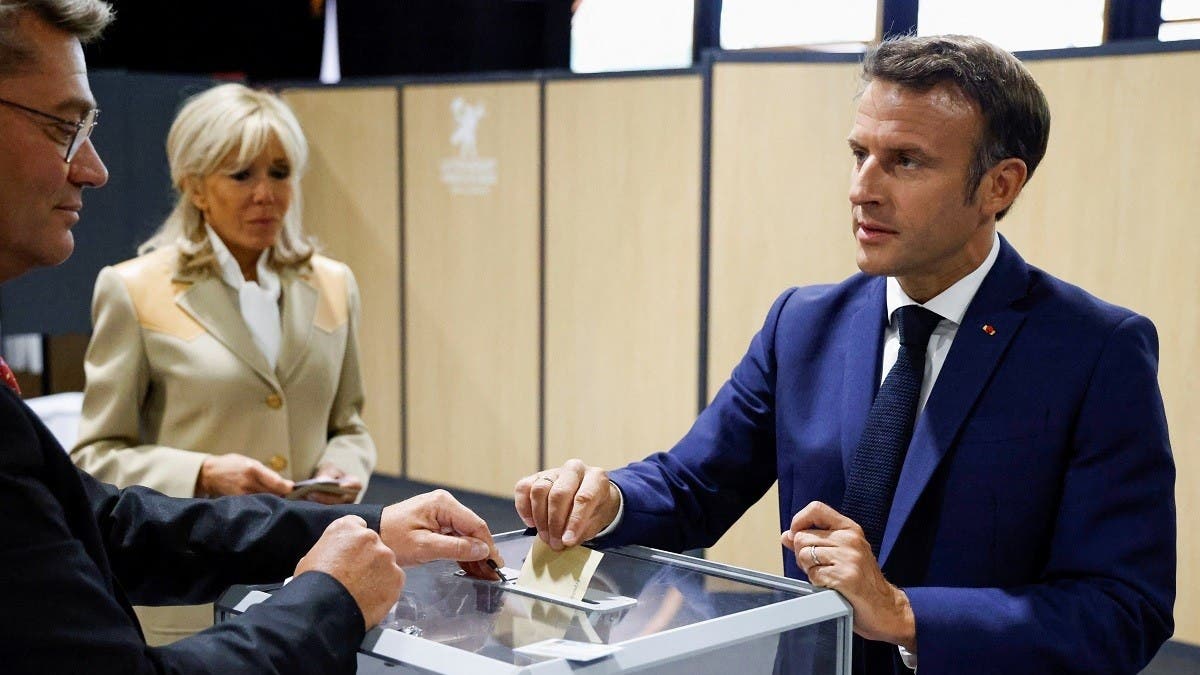French voters are choosing lawmakers in a parliamentary election Sunday as President Emmanuel Macron seeks to secure his majority while under growing threat from a leftist coalition.
More than 6,000 candidates, ranging in age from 18 to 92, are running for 577 seats in the National Assembly in the first round of the election. Those who receive the most votes will advance to the decisive second round on June 19.
For the latest headlines, follow our Google News channel online or via the app.
While candidates have sought to address consumer concerns about inflation, which was a key campaign issue, voter enthusiasm has been generally low. That was reflected in Sunday’s early turnout figures, which showed just 18 percent of France’s 48.7 million voters had cast ballots by noon.
Hard-left leader Jean-Luc Mélenchon, who hopes the election may vault him to the prime minister’s post, was among only a trickle of voters as he cast his ballot in a diverse neighborhood of Marseille, a southern port city.
On France’s opposite coast, a small crowd gathered to watch Macron arrive to vote in the English Channel resort town of Le Touquet.
Following Macron’s reelection in May, his centrist coalition is seeking an absolute majority that would enable it to implement his campaign promises, which include tax cuts and raising the retirement age from 62 to 65.
But the latest opinion polls suggest Macron and his allies may have trouble winning over half of the parliamentary seats. A government with a large, but not absolute majority would still be able to rule, but only by bargaining with legislators.
The main opposition force appears to be Mélenchon’s newly-created coalition made up of leftists, greens and communists. The coalition’s platform includes a significant minimum wage increase, lowering the retirement age to 60 and locking in energy prices.
Mélenchon, an anti-globalization firebrand who has called for France to pull out of NATO and “disobey” EU rules, urged voters to give his coalition a majority and thereby force Macron to name him as prime minister, which would prompt a situation called “cohabitation.”
Though Mélenchon’s coalition could win more than 200 seats, current projections give the left little chance of winning a majority in the National Assembly. Macron and his allies are expected to win between 260 and 320 seats, according to the latest polls.
The National Assembly has final say over the Senate when it comes to voting in laws.
Outside a voting station in a working-class district of Paris, voters debated whether to support Macron’s party for the sake of smooth governance and keeping out extremist views, or to back his opponents to ensure more political perspectives are heard.
“When you have a parliament that’s not completely in line with the government, that enables more interesting conversations and discussions,” Dominique Debarre, retired scientist, said. “But on the other hand, cohabitation is always in some way the sign of a failure.”
The two-round voting system is complex and not proportionate to the nationwide support for a party. Lawmakers are elected by district.
The parliamentary election is traditionally a difficult race for the French far-right’s candidates. Rivals from other parties tend to coordinate or step aside to boost chances of the far-right candidates’ opponents in the second round.
The party led by Marine Le Pen, runnerup to Macron in the presidential election, the National Rally hopes to do better than five years ago, when it won eight seats. With at least 15 seats, the far right would be allowed to form a parliamentary group and gain greater powers at the assembly.
Le Pen herself is candidate for reelection in her stronghold of Henin-Beaumont, in northern France, where she cast her ballot with a beaming smile.
Voters are also casting ballots in France’s overseas territories.
Final polling stations close at 8 p.m. (1800 GMT), with initial polling agency projections soon afterward.
Read more: France’s center right fighting for survival after election humiliation

 World3 years ago
World3 years ago
 World3 years ago
World3 years ago
 Business11 months ago
Business11 months ago
 Entertainment7 years ago
Entertainment7 years ago
 World7 years ago
World7 years ago
 Entertainment7 years ago
Entertainment7 years ago






